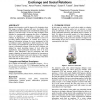Free Online Productivity Tools
i2Speak
i2Symbol
i2OCR
iTex2Img
iWeb2Print
iWeb2Shot
i2Type
iPdf2Split
iPdf2Merge
i2Bopomofo
i2Arabic
i2Style
i2Image
i2PDF
iLatex2Rtf
Sci2ools
HRI
2006
ACM
2006
ACM
Effects of adaptive robot dialogue on information exchange and social relations
Human-robot interaction could be improved by designing robots that engage in adaptive dialogue with users. An adaptive robot could estimate the information needs of individuals and change its dialogue to suit these needs. We test the value of adaptive robot dialogue by experimentally comparing the effects of adaptation versus no adaptation on information exchange and social relations. In Experiment 1, a robot chef adapted to novices by providing detailed explanations of cooking tools; doing so improved information exchange for novice participants but did not influence experts. Experiment 2 added incentives for speed and accuracy and replicated the results from Experiment 1 with respect to information exchange. When the robot’s dialogue was adapted for expert knowledge (names of tools rather than explanations), expert participants found the robot to be more effective, more authoritative, and less patronizing. This work suggests adaptation in human-robot interaction has consequences f...
| Added | 13 Jun 2010 |
| Updated | 13 Jun 2010 |
| Type | Conference |
| Year | 2006 |
| Where | HRI |
| Authors | Cristen Torrey, Aaron Powers, Matthew Marge, Susan R. Fussell, Sara B. Kiesler |
Comments (0)

